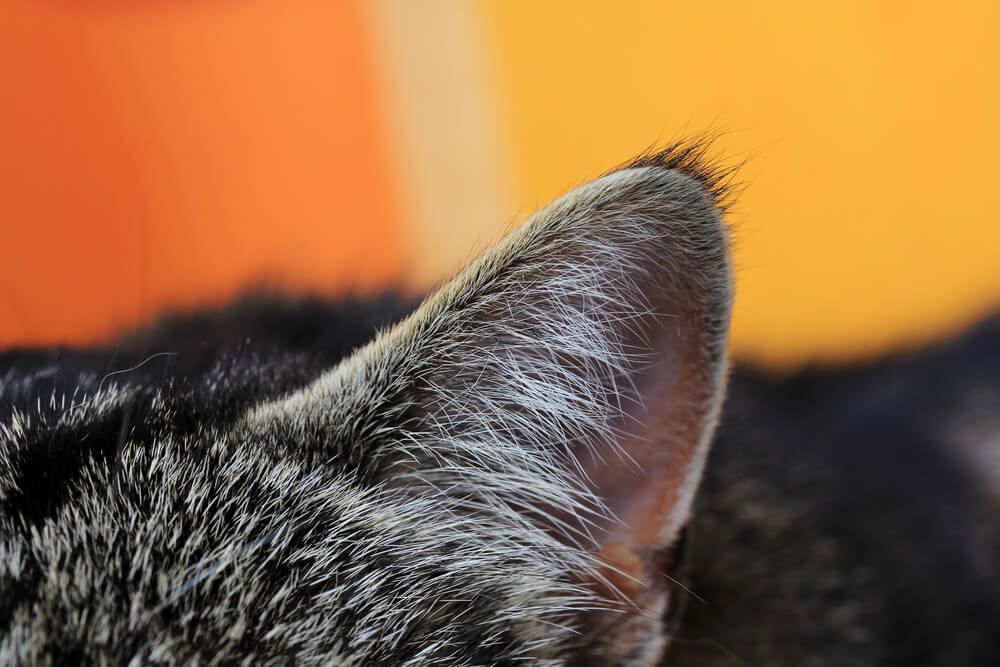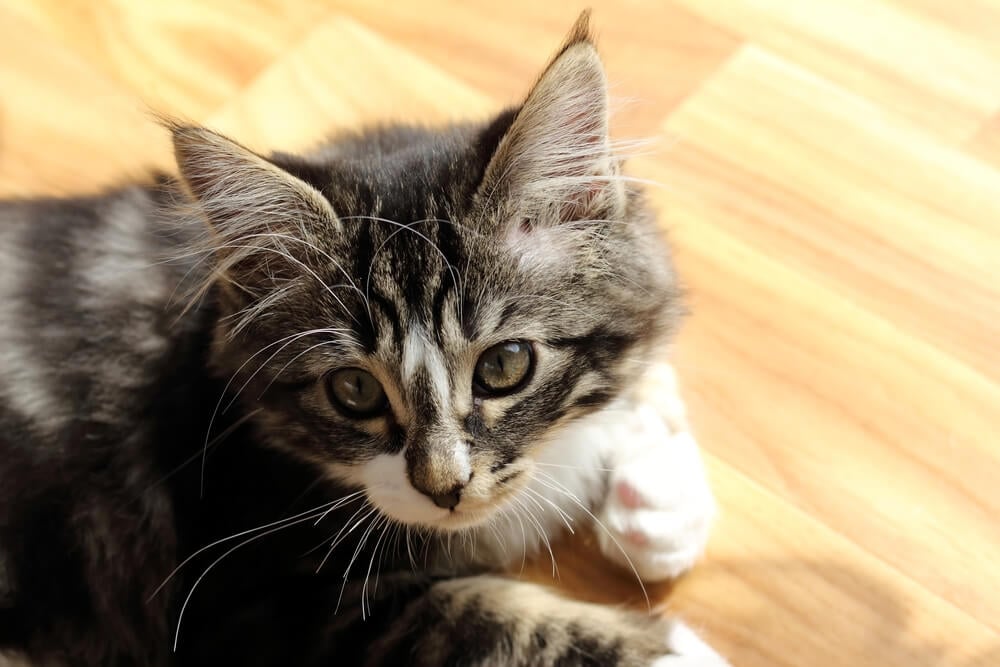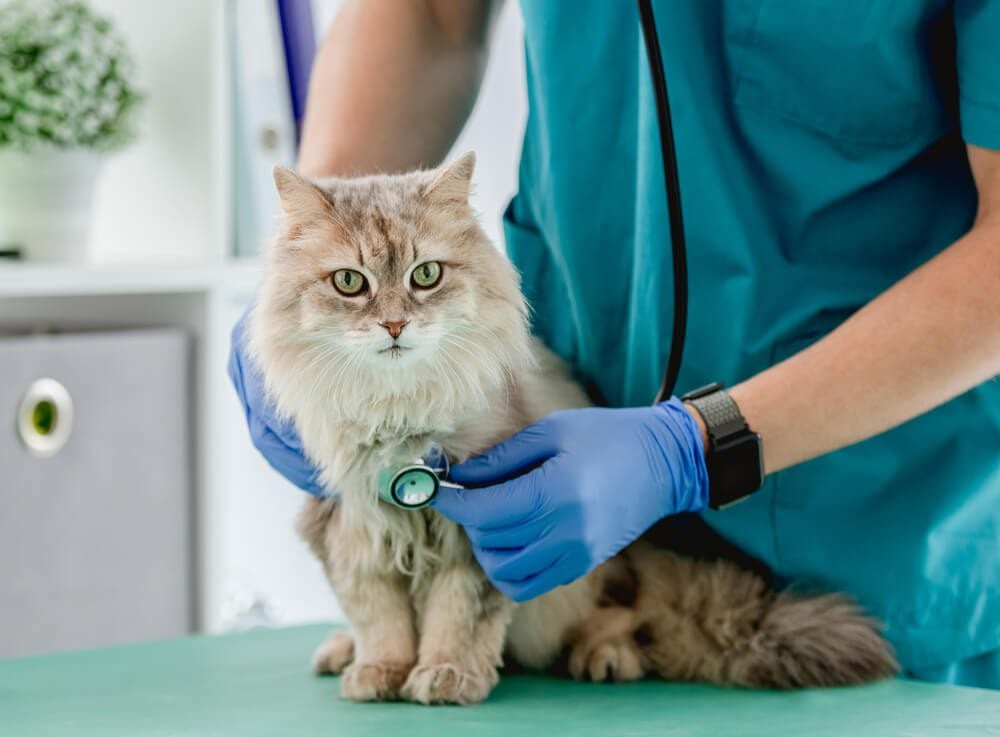Cat Losing Hair on Ears: What You Should Know and What to do About It?

Table of Contents
Why Is My Cat Losing Hair on Its Ears? 
There are several reasons why your cat losing hair on ears. Let us take a look at some common possible causes:
- Hereditary Hair Loss. Cat losing hair on ears may be due to genetics. The onset of bald patches is genetic in certain cat breeds. Affected cats include Burmese, Devon Rex, Birman, and Siamese cats.
- Ear Mites. Ear mites (Otodectes cynotis) are among the most common causes of hair loss. They cause severe itching that can result in hair loss in cats. Mites can also hamper your cat’s health and well-being and make things difficult for cat owners as they require immediate health care. They can further lead to several skin conditions.
- Flea Infestation and Flea Bites. If your cat is infested by fleas, the flea saliva that these pests leave behind can lead to itchy skin. Fleas live within your cat’s fur, close to your cat’s skin. In addition to flea allergy and itchiness, they can also lead to baldness, scabs, and lesions near the cat’s ears and other affected areas.
- Ringworm. Despite its name, ringworm is not a worm but a fungal infection that is found in your cat’s hair follicles and feeds on dead skin cells. It can lead to cat hair loss and bald spots (due to breakage of the hair shafts) and requires oral and/or topical treatments (antifungal shampoos, sprays, and creams) from the vet. If not treated, they can lead to ear infections and the cat losing hair on ears.
- Mange. This is also a contagious mite infestation that can lead to excessive itching. It is mostly found around the face, mouth, ears, and neck. The skin around the affected area can lead to hair loss as it develops a grayish-yellow crust that is similar to a bad case of eczema.
- Food Allergies. An allergic reaction to food is another common reason for itchy skin. In this case, your vet might prescribe antihistamines to counter the itching. If left untreated, it can cause hair loss which is usually irreversible. This can be a pain for cat owners, and they might need to incorporate a special diet for their cat after talking to their vet.
- Alopecia Areata. This is a condition that lacks a lot of information, considering it is not very well understood. However, it is possibly an autoimmune condition that often becomes complicated by your cat’s diet. It is also responsible for hair loss in and around the face and ears. One way to reduce this is by eliminating the allergens from your cat’s diet after talking to your vet.
- Overgrooming and Excessive Licking. Chronic stress leads to overgrooming and excessive licking in cats. This can then lead to hair loss that could be irreversible. There could be several reasons for this, including stress. It is best to talk to a vet if you observe your cat engaging in excessive licking and grooming.
- Hormonal Imbalances. Another prominent factor that can lead to hair loss is an imbalance in your cat’s hormones. The most common endocrine issue resulting in cat losing hair on ears is overactive thyroid gland (hyperthyroidism).
- Solar Dermatitis. This skin disease is also known as sunburn. It can lead to painful burning and some amount of hair loss in cats. If your cat has pink skin and lighter fur, chances are it might get sunburnt easily. Therefore, it is best to keep it indoors on hot days.
How can I Treat a Cat Loosing Hair on its Ears?
A cat losing hair on ears requires veterinary attention to determine what is causing the alopecia. If your vet finds fleas leading to hair loss, they might suggest a flea treatment plan.
The exact diagnostic process and treatment for a cat losing hair on ears, depends on the trigger or underlying cause. For example, the vet will also take hair samples and scrape a little skin sample to test for ringworm and other parasites. Alternatively, they may take a blood sample.
If the underlying cause is a behavioral reason for your cat’s over-grooming leading to hair loss, your vet might discuss your cat’s lifestyle to figure out what is causing them stress.
There are also a few other options that you can try at home for a cat losing hair on ears. These are mentioned below.
CBD Oil for Cats. This product enhances bone & joint health in your cat. Additionally, it also promotes relaxation & helps your cat combat stress. If your cat has sensitive skin and is prone to seasonal allergies, this product can do wonders for your feline friend. It is also great for boosting your cat’s immune system and improving the cognitive function of your cat.
This CBD product is tested by a third party and has been manufactured in the USA using organic ingredients. Pet owners give this product 4.5 out of 5 stars.
Ear Cleaner for Cats. This cleaner washes pathogens, grime, and most other common invaders in a cat’s ears. If you include this ear cleaner in your weekly grooming routine, you will help keep your cat’s ears safe and healthy.
Truseb Ear Flush is advanced Veterinary formula with a broad spectrum flush to solve discharge, smelly ears, redness, and head shaking. This product not only cleans wounds but also dries them, ensures expedited healing, and fights stubborn ear infections.
This cleaner restores your cat’s ears to their natural healthy state. Helps with your cat’s ear infection and ear problems and flushes away unwanted visitors. Pet owners give this product 4.4 out of 5 stars.
Zymox Otic Ear Solution. This is a gentle, no-sting formula that helps ease painful ear infections caused by germs, fungi, and yeast. The solution provides a safe, natural alternative to oral medication with 1% Hydrocortisone for itch relief.
There is no pre-cleaning of painful ears required. Simply fill the ear canal and let this powerful solution get to work.
This ear cleaning solution offers ear care for dogs and cats. It helps soothe ear infections, redness, and inflammation for pets of all ages. Pet owners give this product 4.7 out of 5 stars.
Hypoallergenic Shampoo for Cats. PetO’Cera pet shampoo is formulated exclusively for cats to deliver advanced moisture protection by soothing and moisturizing dry feline skin. Made with safe ingredients, this cat shampoo effectively works to tackle odors and maintain your pet’s coat clean and fluffy.
PetO’Cera cat shampoo features a blend of eleven botanical extracts that offer numerous benefits for your cat’s itchy skin.
Loaded with allantoin and ceramide to enhance your cat’s healthy skin, this product helps soothe and relieve your cat’s sensitive skin while calming irritations. Pet owners give this product 4.5 out of 5 stars.
When Should I Go to the Vet for a Cat Losing Hair on Their Ears?

A cat losing hair on ears should be examined by a vet if the hair loss is accompanied by additional issues such as:
If you observe any of these signs, it is best to take your cat to the veterinarian before its condition worsens. A cat losing hair on ears is not an emergency, but the more you wait, the worse it can become.
How do I Prevent Cats a From Losing Hair on Their Ears?
There are several methods that cat owners can apply to prevent their cats from losing hair around their ears. Preventing the “cat losing hair on ears“ scenario is best done with the following tips and products:
- Keep the Ears Clean. Make sure that you regularly keep your cat’s ears clean and free from debris. This can otherwise amplify the problem in the long run and lead to hair loss around their ears. Luckily, there are many cat ear cleaners on the market you can use for everyday ear care.
- Regular Vet Visits. Your cat should be taken to the vet regularly for periodic health checkups. This will ensure that your cat is healthy and free from underlying diseases.
- High-Quality Diet. Rather than feed your cat junk, it is best to feed them a regulated diet. Talk to your vet about what would be a good fit for your cat and make sure that it is healthy. This can prevent the outbreak of health problems.
- Probiotics for Cats. In addition to cognitive support, probiotics are known to provide allergy relief and build your cat’s immunity. They also improve digestion and help maintain gut health. Plus, the product is free from artificial additives and is made with organic ingredients.
- Vitamins for Cats. This product offers mobility, digestion, and immunity support for mature cats. In addition to being pill-free, it is also highly palatable, making it a hit with cats. The tasty gel is easy to administer and is made using human-grade ingredients. This works as a great replacement for pill supplements that can be difficult to administer otherwise.



















